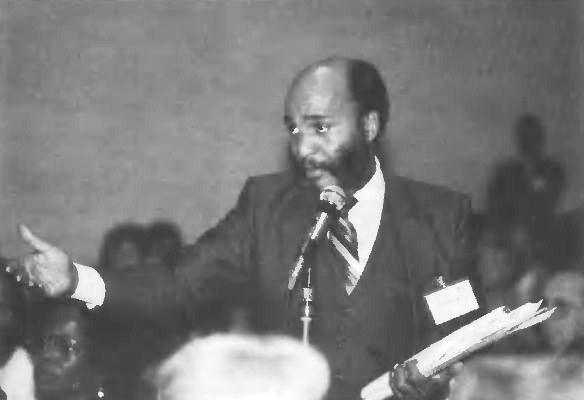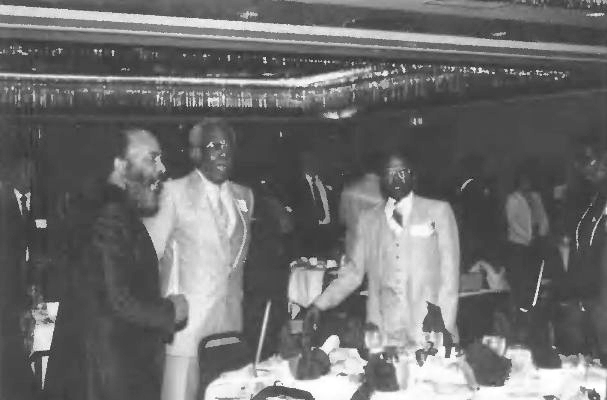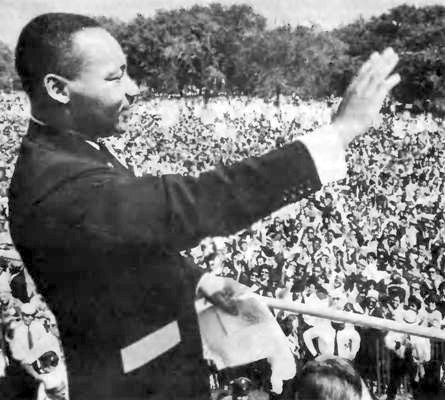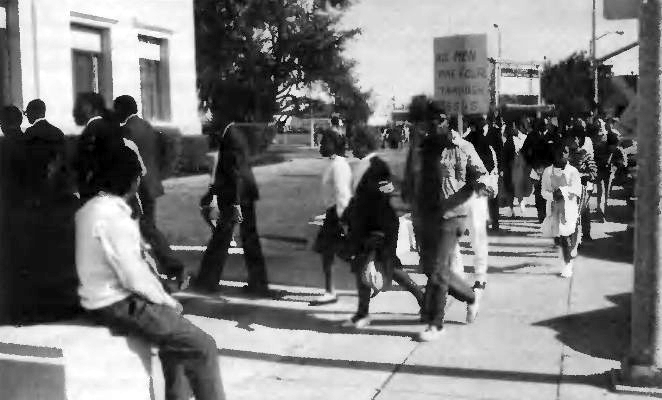![]()
The Words of the Bevel Family
|
|
The Words of the Bevel Family |

Dr.
James Bevel at the Interdenominational Conferences for Clergy.
Dr. James Bevel is very active in the ICC Alumni Association in Chicago. In the 1960s Dr. Bevel served as the director of both nonviolent direct action and nonviolent education for Dr. Martin Luther King's Southern Christian Leadership Conference (SCLC). A former pastor of the South Shore Community Church in Chicago, Illinois, he is now the founder and president of Students for Education and Economic Development (SEED).
Question: Did you have a good experience on the ICC to Japan and Korea?
Yes, I did. I was particularly inspired by the enthusiasm of the Japanese young people. The way the church distributes spiritual and theological information through the video centers is a tremendous way to make an impact on the young people of that culture.
I was also inspired to see the work of the Unification members in terms of economic and other development. A man who started a church in such humble surroundings, yet now makes such extensive investments in education as The Little Angels School is a man who has his values really straightened out. Here's a preacher who invests in people, who uses the resources available to him to help American preachers come out of their state of lethargy. Question: How do you feel a minister would benefit from participation in the ICC trip to Korea?
I think he would view his life from a whole new perspective after looking at the life of one minister -- Rev. Moon, who has been applying Christian dynamics in his church for 34 years -- and seeing the phenomenal impact his movement is having on the world. I look at it this way: If my car is sitting around in my garage because I can't get it started, and yours is hauling folks up and down the street, then I have to admit that something is wrong with my car. So I think the ICC trip helps preachers to compare what Rev. Moon is doing with what we are not doing. We can gain some insight on how to get ourselves moving and correct some problems we haven't addressed until now. It seems to me that Christians have to be motivated to get out of their "do-nothing" theology.
Question: How would you describe the ICC Alumni Association?
The Alumni Association is a group of men and women who have recognized the quantum leap in theological consciousness that Rev. Moon brings to theology today. Most people have a theology of sitting, where you wait to get to heaven when you die. The Divine Principle is a theology of responsibility; it drives you to tackle society's problems. We're studying it so that we can become more Christ-like in our own ministry and begin to apply the Principle to social problems and needs. It's an association of people who come together to examine, strengthen, and clarify their own theology. We are working with the ICC and the ministers of the Unification Church primarily because they don't just preach sermons and then do things that are unrelated to their theology.
Question: What activities are you working on with the ICC Alumni Association in Chicago?
We meet every Wednesday to pray, study, and work on problems and issues as they arise. We have been involved in several projects. The Chicago Tribune did a scandalous article about "the Moonies," and we took them on and made them stop using the term "Moonies" and use "Unification Church" instead. We picketed them; we went to jail; they took us to court; then we took them to court. They finally dropped their charges and we negotiated a settlement with them.
I'm also taking on the Knight-Ridder News Service, which has been providing newspapers with offensive stories about Rev. Moon and the Unification Church. In addition, we're concerned about the atheists in Chicago who didn't want the nativity scene put up in the Daley Center. And we're fighting the people who are trying to close down the Christian initiative programs in the city. We've also been digging into the issue of prayer and religious education in the schools.
We're studying the possibility of establishing what we call precinct councils, which are local, legally sanctioned government units that can serve as a forum to solve community problems.

Dr.
James Bevel, left, at the first ICC Alumni Association banquet in
Chicago, November 1987.
Question: How has this precinct council project been progressing?
We're borrowing the idea of "home church" from the Unification Church. A precinct council has to be built from a foundation of government, not politics. Instead of competing in partisan politics, the political parties work together to solve problems and to serve the community. We will basically start developing this with revivals and Bible studies and educating people about the Principle so that they can better understand the real essence and meaning of Christianity.
Question: Do you believe the denominations in America can begin working together?
They'll have to unite if anything is going to be done. There's a frozenness among the denominations that is almost as rigid as racism. It's like a class structure. It doesn't allow people to hear logical premises. A man has to learn to listen to the truth wherever it's coming from, even if it's coming from a child. If we're going to address all these issues, such as constitutional and educational problems, homosexuality, promiscuity, broken homes -- I read recently that one-fourth of the children in this country are being raised in one-parent homes -- then people have to break out of their denominationalism and get into principles. When you apply principles to problems, you are thinking, analyzing, and evaluating; when you apply denominationalism, you just perform rituals but you're actually not very effective.
Back in the 1960s, Myles Horton, a white teacher who founded the Highlander Folk School in Tennessee, helped us to break out of racial restrictiveness and to receive people and relate to them based on principles. Rosa Parks [the woman who got the Civil Rights Movement going by refusing to relinquish her seat to a white woman in a bus], Martin Luther King, and all of us went to that school [see box]. I believe that churchgoers are redeemed so that they can help serve the interests and rights of other people, not to get caught up in a concept of self-righteousness based on a certain system of belief. People have to break out of their denominational cocoons so they can become God's people. I think the ICC challenges us to break out of that rigidity.
Question: What do you believe is the Kingdom of God?
I think the Kingdom of God is an eternal prayer meeting. When we can realize an ideal educational system, young people will know how to administrate their churches, their government, their schools, their businesses, and their homes. Marriage won't just be a legalized sexual playmate relationship; it will be a scientific "prayer-mate" relationship of two people working together like brother and sister as well as husband and wife. It wouldn't be an oppressive relationship. There wouldn't be an oppressive social system either, with one race oppressing another race.
In the Kingdom of God, employee/ employer relationships would really be on the level of brother and sister relationships. No one would exploit the ignorance or illness of others, but would educate and heal them and then cooperate with them as members of the community in full standing. Because everybody would learn how to work in all areas of life, then everybody could participate in all levels and dimensions of life.
Question: You are organizing a program in Chicago called Students for Education and Economic Development (SEED). What are you trying to accomplish with SEED?
To me, it's the next phase of the Civil Rights Movement. In the 1960s, we used nonviolence to tear down the barriers that restricted the African- American community, but now we have to work to strengthen the democratic, constitutional process SEED teaches young people to initiate, develop, maintain, and administrate their government, their churches, their businesses, their clinics, their homes, and their schools through the science of the Lord's Prayer. It shows them how to save money and begin an endowment, and then to use the interest from that to start any of six areas of business: farming, garment making, tool making, house building, transportation, and hospital or clinic administration.

Dr.
Martin Luther King, Jr.
Question: Dr. Martin Luther King, Jr. What do you feel Americans should remember when we celebrate this holiday?
Instead of just being awed by Dr. King, people should be inspired to take Christian theology and apply it to social problems today. In the Civil Rights Movement in the 1960s (which we called the nonviolent movement), instead of working on solutions in terms of power politics, we came together and worked on solutions in terms of healing and education. I think that today, tragically, people are missing this point. I've been around college campuses and heard students say, "Martin Luther King was a bigger-than-life person. We couldn't do what he did." But all we did at that time was honestly analyze ourselves and then go through a process of purification -- of getting the contempt, pettiness, lust, fear, and hate out of ourselves. We made a commitment that we would love and uphold the truth until the problem of racism was solved.
Faith is the core of nonviolence. Nonviolence has to be practiced always, not just in the presence of a television camera. And the process works because you don't see others as enemies, you just have problems and solutions. People have forgotten that those were the dynamics of the movement, so we have to somehow get that message back out to them. I have plans to write a book this year. It will be a tool to educate people to look at that part of history and extract the scientific application of these principles and use them in their own situations.
Question: To you, who is Rev. Moon?
To me, Rev. Moon is like a modern-day Jonah. I think he is being called by God to awaken people. He makes the statement that Jesus' mission was not finished when he died. Well, a lot of people get mad about that. But I always ask them, "You don't see the Kingdom of God, do you?" There are problems Jesus didn't work out because he didn't have the community in which to work them out. I think some people have difficulty with that idea because they don't understand how God has tried to work in history. Jesus taught us to become one with him and to complete their work. I think that Rev. Moon, like King, is somebody who takes the message of Jesus seriously enough to practice it. I think people get angry because they are being challenged to obey God and give their life in total service without any reservation, and they don't want to do that. Rev. Moon does that, and it's threatening to people because, when somebody comes by who is dead serious, and you're half-way playing, then your game is exposed.
Rev. Moon is like a Jonah or a Christ for this period, and I believe that when people listen to what he's teaching and apply it, it will break down barriers. It will make people burn to bring prayer back into the schools and morality back into the society. It is the only strategy that can motivate Christianity and democracy to promote themselves with love, service, and work.
In terms of my work now with the ICC and the Unification movement, I see Rev. Moon as being like a quarterback. I saw Dr. King as a quarterback, and I worked with him because his actions were based on theological principles. That's the same reason why I work with the Unification Church. God was using Dr. King, but he got killed in 1968. Rev. Moon came to this country in 1971, and I think that when black people study Rev. Moon, and when Unification members study the movement of the 1960s, they're going to find a real parallelism. Where Rev. Moon uses the Principle, King talked about nonviolence. Rev. Moon talks about sacrificial love, and King talked about redemptive suffering. It's the same thing -- the principle that you solve problems not by joining one side, but by applying the love principle. When Rev. Moon talks about "Headwing," it's the same thing Dr. King was talking about when he said, You don't go to the Democrats or to the Republicans; you just address the problem and allow God to work." I see Rev. Moon's work in America as a continuation of the same divine historical movement of love for God and for neighbor and for assuming responsibility based on that love.

A
march was held by the ICC Alumni Association of Stockton, California,
on Martin Luther King Day, January 18, 1988, to dramatize King's
historic freedom marches and to emphasize the nation's need to still
"fulfill the dream."
Dr. King taught us a lesson about how to take Christian theology and solve social problems. He came upon us while we were whimpering and whining and pretending that we were believing and worshiping and serving God through Jesus Christ, and he proved that we were liars. Today we are still on the dung heap of history because we didn't stop to turn aside and ask ourselves, "Who is this man who talks differently and acts differently, and who the newspapers tell lies about, and who the police put in jail?" Well, let me tell you something. You have to learn how to listen not to what folks say about a man and learn to listen to a man.
In 1971 another man showed up, preaching love, truth, righteousness, and justice. And the same folks who vilified and threw rocks at Dr. King -- and who now sit around and worship him -- are throwing rocks at a man who is bringing the same message again. This time he's not a black man; he's not a white man; he's a Korean man -- Rev. Sun Myung Moon.
I was trying to understand why people say all those nasty things about Rev. Moon. Then I began to go back and read the old Jackson daily newspapers and the Birmingham papers and the Memphis papers, and I found that all of the garbage they say about Rev. Moon they had said about Dr. King. In fact, I found a Washington Post article that said, "Dr. King has served past the usefulness of his own time; he is no longer any good to his people, his cause, or his nation." It was just a few da; s later that he was killed.
Now we have another man in our midst, carrying the light that enlightens every man, and again, most of us don't seem to have enough intelligence to say, "Wait a minute, let me listen to what he's saying." But I said, "I have time to listen, I have time to hear what he is saying, I have time to evaluate and analyze, and I have time to ask questions like, 'If I carry out what he says, what will it mean for my life?"' That's how I listen to everybody. That's how I got involved with Dr. King. He was saying, "You should love your enemy. You should not let the hateful lies that other folks tell and the intimidating things they do to you stop you from doing what's right!" And I said to myself, "Well, that's true. That's just what Jesus taught. We should turn the other cheek!" Then Dr. King, just as Jesus did, got out and demonstrated what he was talking about.
I recently read one of Rev. Moon's speeches, and I just want to share some of it with you. He says,
When we consider the beautiful tradition of America, we realize that religious freedom has always been one of the first priorities in American affairs.... Indeed, our political institutions cannot be separated from the religious assumptions which are their very foundation.... If all of our human ancestors had been fully obedient to God, we would be living in a world of one family of man, a world in which every member of the human race would be knit together as brothers and sisters.
Listen to the message that the man brings -- that the teaching of Jesus Christ is not only the basis for our salvation, but also the very foundation for our laws, our political institutions, and our way of life. This is the man that both white folk and Negroes alike are throwing rocks at. This is the man they call a "cultist." But I don't pay any attention to illiterate Negro preachers or racist white men. As soon as a prophet of God begins to speak, then liars and cowards who don't have the courage to stand on any principles begin to whisper and gossip. Yes, among us is a man. And somehow sissies have problems with such a man and don't want anybody to listen to him speak.
Let me read some more from his speech.
America's blessings, however, are not for the sake of America alone; they are for the sake of the world. America is playing a great role in the dispensation of God's providence today, to make possible one world under God.... We must go down on our knees before our Heavenly Father and once again renew the covenant which America has made with God. What greater challenge to America than to be called to sacrifice, unite, and work hard? But what shall we heed -- the world, or God?"
Like Jonah of old, he is calling us to repentance. We need to listen to what he has to say. These are not the words of a cult leader. These are the words of a prophet.
When Dr. King came among us, he also called us to repentance and taught us how to take Christian theology and use it to solve problems. I'd like to read from the Chicago Sun Times, December 1965, from an article by Robert Novak: "Ignored by Chicago white leaders, a tough young Negro wearing a yarmulke is building a revolution in the city's West side. He is Rev. James Bevel, the most revolutionary leader in Dr. King's SCLC." But in those days, most people, even preachers, still hid behind bushes and would not come forth to say, "Dr. King, I will join you; I will help you."
Prophets have come among us and somehow we always missed them. And after they're dead and gone, we stand up and worship them. Don't listen to gossip from the newspapers and other ignorant people. I admonish you to come and listen to this prophet yourself, consider what he is saying, and apply the principles he speaks of to your own life and see if you don't get results. I urge you to join this movement. Wake up and let's build the Kingdom together! God bless you and keep you.
According to Rev. Bevel, many of the leadership of the Civil Rights Movement in the South attended one or more of the seminars taught by Myles Horton at his Highlander Folk School in Tennessee. Rev. Bevel describes Mr. Horton as a man having a pure and Christ like heart and, "like Socrates," an ability to perceive contradictions and erroneous assumptions in people's thinking. He challenged his black students' feeling of inferiority, pointing out that there was no logical reason why he as a white man could do more than they could.
Mr. Horton attended Union Theological Seminary in the 1930's and married a Danish woman whose father had developed folk schools in Denmark, schools that nurtured basic human wisdom rather than intellectual book learning. Mr. Horton established the Highlander Folk School in Monteagle, Tennessee, originally to help Appalachians deal with their relationship with the coal miners, and then extended his "ministry of reconciliation" to the black population. He conducted seminars to help his students solve the problems they faced, with the primary understanding that if they didn't change themselves, they wouldn't be able to solve their problems. He would bring racist white youth together with equally racist black Muslim youth, and by the end of one weekend they would all be in tears because they had to leave one other.
Unfortunately, like many great-minded and big-hearted people, Mr. Horton wasn't recognized by the other white people in his environment, and was defamed, as were Rev. Moon and Dr. King, by the media. Rev Bevel calls him a "giant spirit" who in many ways helped father the Civil Rights Movement.